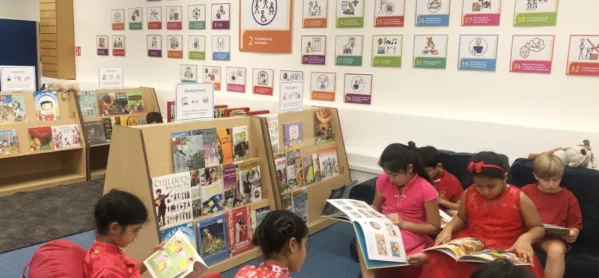- Home
- How the UN’s 54 child rights guide our wellbeing goals
How the UN’s 54 child rights guide our wellbeing goals

Now more than ever there is a tension at the heart of teaching: how to balance the quest for achievement against the risk to wellbeing such pressure might bring.
It’s an issue that we at Tanglin Trust School have been addressing on a six-year journey to embed positive education principles across our three schools’ curricula through proactive, age-appropriate initiatives linked to wellbeing.
While it means finding more time in already busy schedules, the benefits are unquestionably worthwhile: especially if you can find the right framework to help structure this goal.
Respecting rights
At Tanglin, we have used the Rights Respecting Schools Award (RRSA), run by UNICEF UK as a key initiative to guide our work on positive education and wellbeing in the junior school. The RRSA encourages schools to place the UN Convention on the Rights of the Child (CRC) at the heart of their ethos and curriculum.
There are three tiers of accreditation that schools can achieve to do this:
- Bronze: Rights Committed
- Silver: Rights Aware
- Gold: Rights Respecting
While the RRSA is well-known in the UK, it is less well-known internationally. In fact, Tanglin recently became the first school outside the UK to receive the Gold accreditation for our junior school - an achievement we are very proud of.
How does it work?
Schools are required to implement three evidence-based strands of the RRSA that cover:
- leadership of the school;
- knowledge and understanding of children’s rights, ethos and relationships; and
- the empowerment of children and young people.
In completing each level, schools work towards the recognition that they have embedded children and young people’s rights in their school’s practice and ethos. This is no small task.
There are 54 rights in the UN Convention of the Rights of the Child, and to achieve Gold pupils had to have a broad knowledge of these rights, including some of the lesser-known ones that require deeper thought - for example, why every child has the right to a birth certificate.
Students are also made aware of rights-related terms such as “universal”, “inalienable”, “indivisible” and “interdependent”, and what they mean.
Furthermore, these ideas must also exist not just in the classroom but right across the wider school community with parents, for example.
How did we do it?
Our journey to Gold began with a focus on RRSA in our school newsletter, an RRSA information workshop for parents and the planning of RRSA topics within our junior school assembly rota.
Starting in this way helped get everyone on board with the idea and enthused.
From here we held a whole school “Impact Day” - a day we use to kickstart our intentions for the school year - which included RRSA-focused lessons.
One such lesson explored Articles 8 and 9: the rights of children to have a name, an identity and an official record of who they are.
This gave children a powerful insight into one of the many challenges child refugees face: not having an official birth certificate - a reality for many.
Rights were also integrated into the fabric of the school itself, through rights displays, article notices, and a dedicated Rights Respecting section in the junior school library.
We also used the RRSA as a means to link current affairs and world events to curriculum learning, such as the International Day for the Elimination of Racial Discrimination, the Black Lives Matter movement, World Religion Day, Autism Awareness Day and Mental Health Week to name but a few.
These connections weren’t just made in lessons but across school life: in assemblies, weekly Impact Hour lessons, home learning, round-table meetings, school council meetings, whole school RRSA TV displays and remote learning activities.
As an international school with children representing over 50 different nationalities, Tanglin pupils are generally knowledgeable and curious about different cultures, so they really engaged with the award and threw themselves into the activities.
Parents also saw a huge benefit in the RRSA award process culminating in Gold.
“Learning about rights has made a very positive impact on my child,” said one. “He’s more aware of the wider world and has passionate conversations with his family and friends about how all children should know their rights.”
A rewarding effort
This was no easy undertaking and schools keen to likewise should not take it on lightly. However, it is unquestionably worthwhile, as our RRSA coordinator, Cameron Davidson sums up:
“The award provides so many relevant learning opportunities, sparks interest in global issues and, most importantly, empowers children to enjoy and exercise their rights; lead happy, healthy lives; and be responsible, active citizens.”
“Achieving Gold: Rights Respecting shows a school’s commitment to promoting children’s rights and encouraging adults, children and young people to respect the rights of others.”
Philippa Hatton is deputy head of junior school (pastoral) at Tanglin Trust School in Singapore.
To find out more about the school’s positive education ethos and strategy, the school will be sharing their experiences at the forthcoming IPEN conference.
Keep reading for just £1 per month
You've reached your limit of free articles this month. Subscribe for £1 per month for three months and get:
- Unlimited access to all Tes magazine content
- Exclusive subscriber-only stories
- Award-winning email newsletters